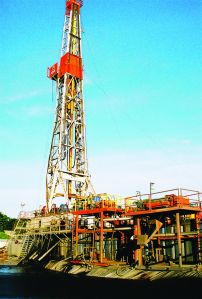Water is essential to our everyday needs. While many feel secure about the quality of their water, a recent technology threatens to contaminate our drinking supply with cancerous chemicals that cannot be filtered.
Communities across the state are polarized in a debate over natural gas drilling in the Marcellus Shale, a layer of rock thousands of feet below the ground. This layer of rock stretches across western and northeastern Pennsylvania.

The fight is over what is called fracking, or hydraulic fracturing, a drilling process used to extract the natural gas. Water, combined with potentially cancer-producing chemicals, is pumped thousands of feet deep into the ground to break up or fracture the sedimentary rock or shale.
“They push this water down into the shale through the well and it cracks away at the rock until they can get a way at the gas essentially,” Dr. Shelby Hockenberry, assistant professor of political science, said.
The fight is over whether this process could also be contaminating the water supply of regions as far away as Philadelphia, according to Dr. David Dunbar, associate professor of biology.
“The drilling uses chemicals that the companies are not disclosing,” Dunbar said. “The main issue with Marcellus Shale drilling with the energy companies is they do not have to abide by environmental regulations.”
Dunbar said the water treatment plants where the Marcellus Shale formation lies do not have the capabilities to filter the contaminated water. The water is then brought to treatment plants in the Philadelphia region that have the capability. Currently, the filtration system cannot tell whether or not all the carcinogens have been removed from the residents’ drinking water.
One thing is certain: the contamination of wells across Pennsylvania is already happening. Toxic chemicals and methane contamination have occurred in Dimock Township, Susquehanna County, due to natural gas drilling, according to an Associated Press article published earlier in September.
Companies that employ hydraulic fracturing are exempt from the regulations enacted in 1974 by the Safe Drinking Water Act with the passage of the Energy Policy Act of 2005.
Environmental groups are currently pitted against big energy corporations over the ecological impacts of drilling.
Exxon Mobil, the largest oil company in the world, is attempting to expand its influence in the Marcellus Shale. Cynthia White, media relations adviser for the company, confirmed in an e-mail interview that hydraulic fracturing is used by the corporation across Pennsylvania.
This past January Rex Tillerson, CEO of Exxon Mobil, testified before Congress.
“We can now find and produce unconventional natural gas supplies miles below the surface in a safe, efficient and environmentally responsible manner,” Tillerson said at the testimony, according to ExxonMobi.com.
However, the Delaware River Basin Commission disagrees. They recently issued a determination that energy companies must go through extra regulatory procedures to receive a drilling lease in Special Protection Waters in Pennsylvania.
According to the document, “natural gas extraction projects… may individually or cumulatively affect the water quality of Special Protection Waters by altering their physical, biological, chemical or hydrological characteristics.”
Besides the hazardous chemicals, the inability to take away the salt out of the water also poses a serious problem to the region.
Dr. Caroline Nielsen, assistant professor of biology, said that as the rocks dissolve in the fracking process salt is added to the already contaminated water. None of the treatment methods used right now filter salt.
“It’s very hard for plants and animals trying to live in the Delaware River to adapt to that salinity,” Nielsen said.
The environmental concerns go beyond the possible contamination of our drinking water. The entire ecosystem can be affected as infrastructure is built to build these drilling wells according to Nielsen.
“It also can contribute to a lot of deforestation because they have to build roads, drilling platforms in areas that are forests and it can potentially cause groundwater contamination,” Nielsen said.


